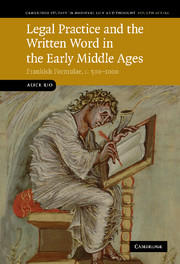Book contents
- Frontmatter
- Contents
- List of tables
- Acknowledgements
- List of abbreviations
- INTRODUCTION
- Part I Formulae, Charters and the Written Word
- 1 ORALITY AND LITERACY IN FRANKISH SOCIETY
- 2 AN UNEASY PARTNERSHIP? FORMULAE AND CHARTERS
- Part II Inventory of the Evidence
- Part III Formulae as a Historical Source: Limits and Possibilities
- CONCLUSION
- Appendix A handlist of manuscripts
- Bibliography
- Index
- Manuscript Index
2 - AN UNEASY PARTNERSHIP? FORMULAE AND CHARTERS
Published online by Cambridge University Press: 14 August 2009
- Frontmatter
- Contents
- List of tables
- Acknowledgements
- List of abbreviations
- INTRODUCTION
- Part I Formulae, Charters and the Written Word
- 1 ORALITY AND LITERACY IN FRANKISH SOCIETY
- 2 AN UNEASY PARTNERSHIP? FORMULAE AND CHARTERS
- Part II Inventory of the Evidence
- Part III Formulae as a Historical Source: Limits and Possibilities
- CONCLUSION
- Appendix A handlist of manuscripts
- Bibliography
- Index
- Manuscript Index
Summary
Because scribes removed most specific details from their existing documents in the process of turning them into models, formulae lack much of the precise contextual information which constitutes the most valued feature of charters, such as names, places and dates. This places obvious limits on the ways in which they may be exploited as a source. These limits have always, to a certain extent, proved a hindrance to the use of formulae as a source by historians. They are, however, particularly obstructive now that the stronger consciousness of the difficult relationship between text and reality characteristic of modern scholarship has led to a more urgent search for contextualisation: there is now a more acute awareness of the ideological dimensions of even the most outwardly utilitarian sources, such as laws, capitularies and charters, and of the risks involved in taking for granted the information they provide as being generally representative. The effort to assess the scope of such sources in more precise terms has brought on a greater emphasis on the diversity of medieval experience, and on building distinct local, regional or micro-histories. By the same token, the most successful recent large-scale analysis of this period, Chris Wickham's Framing the Early Middle Ages, relied on comparative work between such detailed studies, rather than trying to downplay or harmonise regional differences.
- Type
- Chapter
- Information
- Legal Practice and the Written Word in the Early Middle AgesFrankish Formulae, c.500–1000, pp. 27 - 40Publisher: Cambridge University PressPrint publication year: 2009

